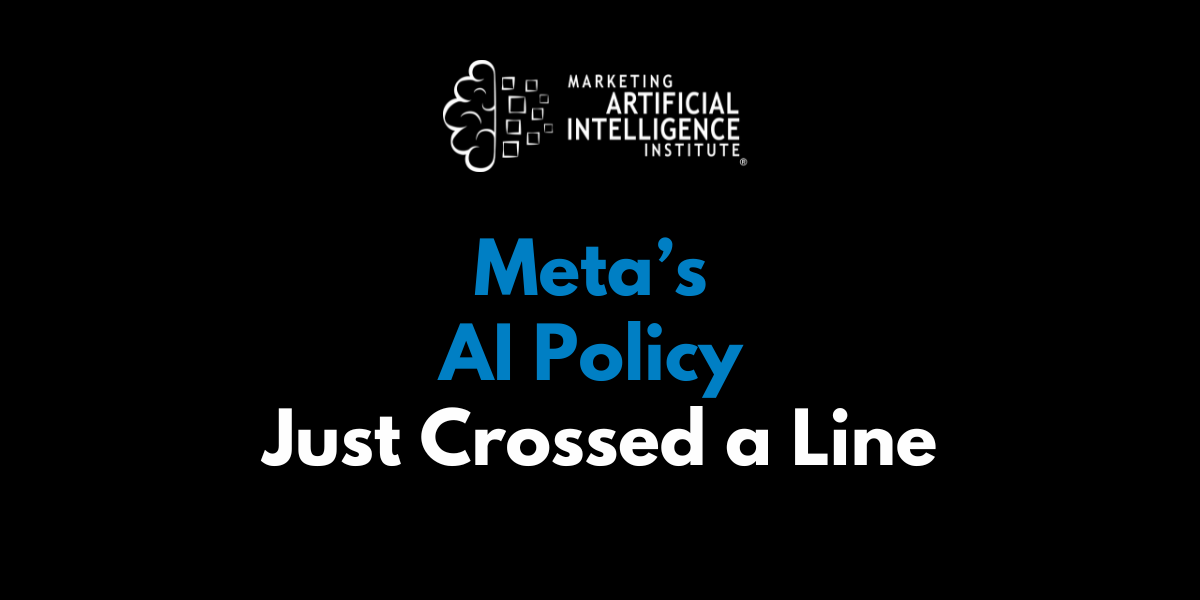A leaked 200-page policy document just lit a fire under Meta, and not in a good way.
According to an exclusive investigation by Reuters, the internal guide, approved by Meta’s legal, policy, engineering teams, and even its chief ethicist, gave shockingly permissive instructions on what its AI bots could say and do.
That includes engaging children in romantic or sensual conversations, generating racist pseudoscience, and creating false medical claims, as long as the content avoided certain language or came with a disclaimer.
Meta confirmed the document’s authenticity. And while it says the guidelines are being revised, the fact that these standards ever existed at all has experts (and the US. Senate) deeply concerned.
To unpack what it means for the future of AI safety, I spoke with Marketing AI Institute founder and CEO Paul Roetzer on Episode 162 of The Artificial Intelligence Show.
What's In the Problematic Guidelines?
Here’s what Meta’s leaked guidelines reportedly allowed:
- Romantic roleplay with children.
- Statements arguing black people are dumber than white people, so long as they didn’t “dehumanize” the group.
- Generating false medical claims about public figures, as long as a disclaimer was included.
- Sexualized imagery of celebrities, like Taylor Swift, with workarounds that substituted risqué requests with absurd visual replacements.
And all of this, according to Meta, was once deemed acceptable behavior for its generative AI tools.
The company now claims these examples were “erroneous” and “inconsistent” with official policy.
A Swift Political Backlash
The fallout came fast.
US Senator Josh Hawley immediately launched an investigation, demanding that Meta preserve internal emails and produce documents related to chatbot safety, incident reports, and AI content risks.
Meta spokesperson Andy Stone said the company is revising its AI content policies and that theses conversations with children never should have been allowed.
But as Stanford Law School professor Evelyn Douek told Reuters, there’s a difference between letting users post troubling content and having your AI system generate it directly.
“Legally we don’t have the answers yet,” Douek said. “But morally, ethically, and technically, it’s clearly a different question.”
“What's Your Line?”
“These are very uncomfortable conversations,” says Roetzer, who has two children of his own. “It’s easier to go through your life and be ignorant to this stuff. Trust me...I try sometimes.”
But it's important to be aware of the issue, he says. Because the guidelines weren’t just technical documentation. They reflected deeply human choices. They were decisions made by actual people at Meta about what was acceptable for AI to say.
“Some human wrote these in there. Then a bunch of other humans with the authority to remove them chose to allow them to stay in," says Roetzer.
That raises an unsettling question for anyone working in AI:
"I think everyone in AI should think about what their 'line' is," she posted on X.
i think everyone in ai should think about what their "line" is.
— Joanne Jang (@joannejang) August 16, 2025
where if your company knowingly crosses that line and won't walk it back, you'll walk away
this line is personal, will be different for everyone, and can feel far-fetched even. you don't have to share it with… https://t.co/lJ5TIEVXv1
It’s a personal question. But it’s one that many in the AI industry may soon be forced to answer.
It’s Not Just a Meta Problem
Meta’s mistakes don’t exist in a vacuum.
Every major AI company is wrestling with the same core dilemma: Where do you draw the line between freedom and safety, creativity and harm?
The problem is compounded by the way these systems are built. AI models are trained on massive troves of human data. That data is good, bad, and often disturbing. If someone doesn’t explicitly block something, it can (and probably will) show up in the outputs.
"Models want to just answer your questions," says Roetzer. "They want to fulfill your prompt requests. It's humans that tell them whether or not they're allowed to do those things."
But what happens when the humans in charge get it wrong? The Meta example provides one sobering example of just how off the rails things can go when that happens.
Why This Moment Matters
Whether you’re in AI, marketing, or just an everyday user, this episode is a wake-up call. These models are already deeply embedded in how we communicate, learn, and entertain ourselves. The ethical guardrails put in place today will shape the AI landscape for years to come.
Meta, like every tech giant, is pushing forward fast. But if their internal standards are this flawed, what does that say about the next wave of AI tools?
In the meantime, Roetzer offers one small step forward:
He created Kid Safe GPT, a free AI assistant to help parents talk to their kids about digital safety and AI risks.
Mike Kaput
Mike Kaput is the Chief Content Officer at SmarterX and a leading voice on the application of AI in business. He is the co-author of Marketing Artificial Intelligence and co-host of The Artificial Intelligence Show podcast.


